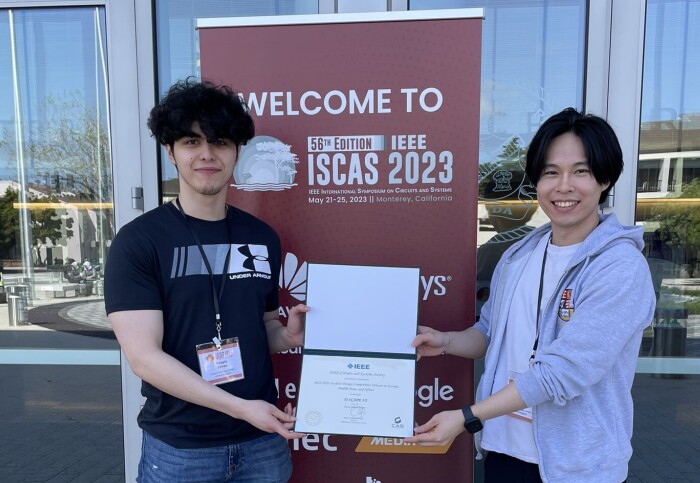Undergraduate students shine on the international stage
by Jane Horrell

Khayle and Xin after the final in Monterey last month
Two final year undergraduates are regional winners of a prestigious global competition for work on device monitoring a life-threatening infection.
Fourth year MEng students Khayle Torres and Xin Wang’s project was selected from all the entries in the Europe, Middle East, and Africa region of the annual IEEE Circuits and Systems Society Student Design Competition. They were invited to present their work alongside the three other global regional champions at in the final in Monterey, California last month.
It’s a great achievement for them both, and they really made our department proud on the international stage Professor Pantelis Georgiou Supervisor
The project — D-SPACE v2 — is a portable, low cost and easy to use lab-on-chip device designed to help front-line workers identify at-risk patients with Dengue — a mosquito-borne viral infection which is spreading throughout the world as global temperatures rise. with 129 countries currently affected.
The best approach to treating Dengue is through consistent patient monitoring. Timely clinical interventions can significantly reduce the mortality rate from 25 percent to less than one percent. Low- and middle-income countries — often the worst affected by Dengue outbreaks — have limited hospital staff and equipment to carry out resource-intensive monitoring.
The Centre for Bioinspired Technology (CBIT) is developing a device capable of consistently monitoring Dengue patients, leveraging the recent advancements in PPG technology, which uses light to measure blood and oxygen volume.
A photoplethysmogram (PPG) is an optically obtained measurement of fluctuations in the volume of blood or air in body tissues. A PPG can be obtained through the familiar pulse oximeter device which illuminates the skin and measures changes in light absorption.
The students’ work is part their final year MEng projects, with Professor Pantelis Georgiou.
Pantelis explained “Khayle and Xin’s project is one system where one student focused on the hardware for the wearable device and the other on the back end infrastructure to allow seemingless connectivity and visualisation of multiple devices, hence two projects."
"It builds on the work of a recent graduate Yuting Xu, who is now undertaking a PhD, and Dr Stefan’s Karolcik’s development of the first D-SCAPE v1. It’s a wearable we are deploying in Vietnam where we are monitoring patients with severe Dengue. It’s a great achievement for them both, and they really made our department proud on the international stage."
Khayle Torres
Khayle worked on the hardware side of the project, implementing the embedded systems, providing the code in order to allow the communication process between the microcontroller and 2 analogue front ends.
“The main objective of my project is to synchronise the two chips in order for the device to be able to perform blood pressure estimation with better accuracy than its v1 predecessor. On top of this I needed to allow the functionality to be able to record up to 8 wavelength PPG readings concurrently using the two chips.”
“I’ve worked on previous projects in the past and none has made me more fulfilled than working on this one. After hearing about the successful clinical trials in Vietnam of the original D-SCAPE, it made me very passionate working on this project as I knew this could genuinely impact people’s lives in a positive way."
"I’m very grateful of my mentors for giving me this opportunity to work on a meaningful project, and guide me from the beginning up to where I’m at now. It’s been in invaluable experience and I’ve had a load of fun working with them."
Xin Wang
Xin’s role was in researching, designing, and implementing the software aspect of the D-SCAPE system that includes the wireless communication capabilities, backend server, database storage and the user interface. Xin’s work includes developing C code for the microcontroller, Python for the servers and JavaScript for the user-interface.
“It has been incredibly rewarding to be able to work on a device that could, one day, have a real-life impact on an issue that much of the world has neglected to talk about.
My mentors, have been supportive since day one and always made sure that it is me that is taking the initiatives and every decision I made was a well-reasoned one. From providing creative ideas to meeting early in the morning of the competition help proof-read out our competition presentation, this award would not have been possible without them."
Future developments
PhD student Yuting explains” ‘the D-SCAPE v2 is an effort in moving towards a wearable form factor for better performance and patient comfort. The system architecture was laid out by me and the D-SCAPE v1 inventor Dr Stefan Karolcik."
"We're now planning to set up an in-lab validation of blood pressure and haematocrit tracking — the volume percentage of red blood cells in blood, measured as part of a blood test — before running another clinical trial in Vietnam soon.”
Congratulations to Khayle, Xin, Yuting, and the team!
Article text (excluding photos or graphics) © Imperial College London.
Photos and graphics subject to third party copyright used with permission or © Imperial College London.
Reporter
Jane Horrell
Department of Electrical and Electronic Engineering